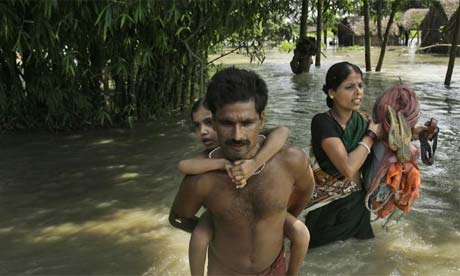Climate change is greatest humanitarian challenge facing the world as heatwaves, floods and forest fires become more severe

Climate change is already responsible for 300,000 deaths a year and is affecting 300m people, according to the first comprehensive study of the human impact of global warming.
It projects that increasingly severe heatwaves, floods, storms and forest fires will be responsible for as many as 500,000 deaths a year by 2030, making it the greatest humanitarian challenge the world faces.
Economic losses due to climate change today amount to more than $125bn a year — more than all the present world aid. The report comes from former UN secretary general Kofi Annan's thinktank, the Global Humanitarian Forum. By 2030, the report says, climate change could cost $600bn a year.
Civil unrest may also increase because of weather-related events, the report says: "Four billion people are vulnerable now and 500m are now at extreme risk. Weather-related disasters ... bring hunger, disease, poverty and lost livelihoods. They pose a threat to social and political stability".
If emissions are not brought under control, within 25 years, the report states:
• 310m more people will suffer adverse health consequences related to temperature increases
• 20m more people will fall into poverty
• 75m extra people will be displaced by climate change.
Climate change is expected to have the most severe impact on water supplies . "Shortages in future are likely to threaten food production, reduce sanitation, hinder economic development and damage ecosystems. It causes more violent swings between floods and droughts. Hundreds of millions of people are expected to become water stressed by climate change by the 2030. ".
The study says it is impossible to be certain who will be displaced by 2030, but that tens of millions of people "will be driven from their homelands by weather disasters or gradual environmental degradation. The problem is most severe in Africa, Bangladesh, Egypt, coastal zones and forest areas. ."
The study compares for the first time the number of people affected by climate change in rich and poor countries. Nearly 98% of the people seriously affected, 99% of all deaths from weather-related disasters and 90% of the total economic losses are now borne by developing countries. The populations most at risk it says, are in sub-Saharan Africa, the Middle East, south Asia and the small island states of the Pacific.
But of the 12 countries considered least at risk, including Britain, all but one are industrially developed. Together they have made nearly $72bn available to adapt themselves to climate change but have pledged only $400m to help poor countries. "This is less than one state in Germany is spending on improving its flood defences," says the report.








No comments:
Post a Comment